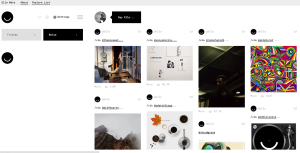Have you heard the news? It’s finally arrived!
No, I’m not talking about the unexpectedly flexible iPhone 6. I’m talking about Ello, the newest social media platform to be given the moniker: “Facebook Killer.” At last, we can interact with one another online in an honest and open realm, free from the looming fear of our personal information being parceled and sold to the shady cabal of Internet advertisers. It’s about time, right?
There’s no doubt Ello has seemingly burst on to the scene overnight. Literally: Overnight. As of Thursday, September 25th, the invite-only platform was seeing 4,000 sign-ups per hour. By the next day, that number had astonishingly ballooned to 40,000 per hour. The waiting list is a million people long. That rate of growth would make even bacteria jealous.
With so much commotion surrounding the nascent network, I had to see for myself what everyone was talking about. Thanks to our Chief Strategy Officer, Scott McAndrew, for helping me secure an invite. It would have been a shame to resort to shelling out $50.00 on eBay just to see what the big deal is.
Why the Ello is it so popular now?
Before diving into what exactly Ello is (or isn’t – more on that in a moment), let’s trace the hype back to the start of this frenzy. Ello was hatched from the mind of Paul Budnitz, creator of KidRobot (a popular Internet retailer of off-the-wall toys). According to The Verge, Budnitz didn’t like any of the current options when it came to sharing project news amongst his friends, so he began working on a new platform to do so. Up until beta invites began going out on August 7th, the private network consisted of about 100 preliminary users.
Fast forward to three weeks ago, when SFist published a story about Facebook’s rigid administration of its “legal name-only” policy on a group of LGBT performers’ profiles. In a display of what appeared to be selective enforcement, Facebook insisted they could only use their stage names on fan pages as opposed to traditional profiles. In that distinction seems trivial, remember that fan pages require ad spend in order to grow and reach a community. The narrative, as it rapidly gained traction in the media, boiled down to: “Facebook Tells Drag Queens ‘No Free Friends’”. Just like that, Facebook had walked itself into a PR crisis.
It only dug itself deeper by trying to specify the policy: “Profiles are for individual use only. We offer Pages for professional personas, organizations, and businesses.” If that statement isn’t corporate-speaky enough for you, Facebook even went as far as to specify acceptable forms of identification that you can provide to justify your name’s legitimacy. If you’re in a need of a good laugh, read the list and imagine sending a recent utility bill to Menlo Park.
Right around when the story began gaining media attention, Ello began to surface as a popular alternative: No asinine rules regarding names, no force-feeding of ads, no brokering of users’ personal data. This seemingly restriction-free platform, coupled with the aura of exclusivity by virtue of its invite-only nature, struck the perfect chord with dissatisfied users. The anonymity gold rush was on.
So what’s behind the curtain?
On its surface, Ello is…minimalistic? It’s separated into two feeds: Friends and Noise. Visually it resembles Tumblr, while the interaction component feels like Twitter. Just a few hours in, I can’t really say I’m itching to abandon my presence on any other networks, but I’m admittedly a vanilla social media user. I use Facebook to share article links, Twitter to follow personalities, and Instagram to occasionally document what I’m looking at. Ello isn’t replacing any of those for me (right now, at least).
It seems every conceivable take has already been written about Ello merely days into its rise. The platform, after all, is in beta testing. Will it be able to keep the lights on as users flock en masse? Will a pay to play business model work in lieu of ads? Should brands resist the urge to jump into the fray? These questions and more will be asked relentlessly as Ello continues to define itself.
For now, I think it’s safe to say that Facebook isn’t going anywhere. It’s a $200 billion corporation. We can hold off announcing the death-knell anytime a competitor comes along. Remember Path and Google+? Not exactly threats to Facebook’s dominance anymore, yet once upon a time their ceilings appeared to be just as high as that of Ello.
According to my first email update from the Ello team, “It feels like we’re throwing the best party on the Internet together.” If that’s the case, I’ll be standing in the corner, waiting to see how this plays out.





